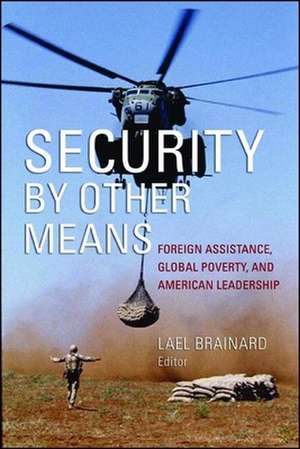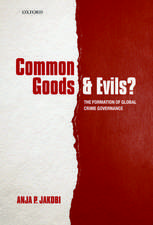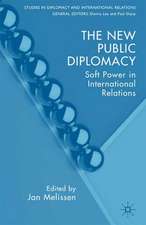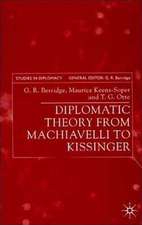Security by Other Means: Foreign Assistance, Global Poverty, and American Leadership
Editat de Lael Brainarden Limba Engleză Paperback – 10 ian 2007
In a world transformed by globalization and challenged by terrorism, foreign aid has assumed renewed importance as a foreign policy tool. While the results of more than forty years of development assistance show some successes, foreign aid is currently dispersed between many agencies and branches of government in a manner that formulation and implementation of a coherent, effective strategy. The current political climate is receptive to a transition toward greater accountability and effectiveness in development aid. Because this transition is clearly an imperative but has not yet been comprehensively addressed, the Brookings Institution and the Center for Strategic and International Studies have conducted a joint study that both assesses the current structures of foreign assistance and makes recommendations for efficient coordination. Drawing on expertise from the full range of agencies whose policies affect foreign aid, Security by Other Means examines foreign assistance across four categories reflecting the interests that aid furthers: security, economic, humanitarian, and political. As disparities in the world become more untenable, foreign aid plays a key role in not only the national interests of the U.S. but also the interconnected interests of the international community. This important new volume takes aim at critical questions in a concerted manner by assigning coherence and effectiveness to U.S. foreign aid. Contributors include Owen Barder (Center for Global Development, formerly UK Department for International Development), Charlie Flickner (former Staff Director of the House Appropriations Subcommittee on Foreign Operations), Steve Hensch (George Washington University), Steve Morrison (Center for Strategic and International Studies), Steve Radelet (Center for Global Development)
Preț: 250.52 lei
Nou
Puncte Express: 376
Preț estimativ în valută:
47.95€ • 52.10$ • 40.31£
47.95€ • 52.10$ • 40.31£
Carte tipărită la comandă
Livrare economică 21 aprilie-05 mai
Preluare comenzi: 021 569.72.76
Specificații
ISBN-13: 9780815713616
ISBN-10: 0815713614
Pagini: 364
Dimensiuni: 152 x 229 x 24 mm
Greutate: 0.51 kg
Editura: Brookings Institution Press
Colecția Brookings Institution Press
ISBN-10: 0815713614
Pagini: 364
Dimensiuni: 152 x 229 x 24 mm
Greutate: 0.51 kg
Editura: Brookings Institution Press
Colecția Brookings Institution Press
Notă biografică
Lael Brainard is vice president and director of the Global Economy and Development Program at the Brookings Institution, where she holds the Bernard E. Schwartz Chair in International Economics. Brainard served as deputy national economic adviser in the Clinton administration.
Descriere
A Brookings Institution Press and Center for Strategic and International Studies publication
In a world transformed by globalization and challenged by terrorism, foreign aid has assumed renewed importance as a foreign policy tool. While the results of more than forty years of development assistance show some successes, foreign aid is currently dispersed between many agencies and branches of government in a manner that formulation and implementation of a coherent, effective strategy.
The current political climate is receptive to a transition toward greater accountability and effectiveness in development aid. Because this transition is clearly an imperative but has not yet been comprehensively addressed, the Brookings Institution and the Center for Strategic and International Studies have conducted a joint study that both assesses the current structures of foreign assistance and makes recommendations for efficient coordination. Drawing on expertise from the full range of agencies whose policies affect foreign aid, Security by Other Means examines foreign assistance across four categories reflecting the interests that aid furthers: security, economic, humanitarian, and political.
As disparities in the world become more untenable, foreign aid plays a key role in not only the national interests of the U.S. but also the interconnected interests of the international community. This important new volume takes aim at critical questions in a concerted manner by assigning coherence and effectiveness to U.S. foreign aid.
Contributors include Owen Barder (Center for Global Development, formerly UK Department for International Development), Charlie Flickner (former Staff Director of the House Appropriations Subcommittee on Foreign Operations), Steve Hensch (George Washington University), Steve Morrison (Center for Strategic and International Studies), Steve Radelet (Center for Global Development)
In a world transformed by globalization and challenged by terrorism, foreign aid has assumed renewed importance as a foreign policy tool. While the results of more than forty years of development assistance show some successes, foreign aid is currently dispersed between many agencies and branches of government in a manner that formulation and implementation of a coherent, effective strategy.
The current political climate is receptive to a transition toward greater accountability and effectiveness in development aid. Because this transition is clearly an imperative but has not yet been comprehensively addressed, the Brookings Institution and the Center for Strategic and International Studies have conducted a joint study that both assesses the current structures of foreign assistance and makes recommendations for efficient coordination. Drawing on expertise from the full range of agencies whose policies affect foreign aid, Security by Other Means examines foreign assistance across four categories reflecting the interests that aid furthers: security, economic, humanitarian, and political.
As disparities in the world become more untenable, foreign aid plays a key role in not only the national interests of the U.S. but also the interconnected interests of the international community. This important new volume takes aim at critical questions in a concerted manner by assigning coherence and effectiveness to U.S. foreign aid.
Contributors include Owen Barder (Center for Global Development, formerly UK Department for International Development), Charlie Flickner (former Staff Director of the House Appropriations Subcommittee on Foreign Operations), Steve Hensch (George Washington University), Steve Morrison (Center for Strategic and International Studies), Steve Radelet (Center for Global Development)









